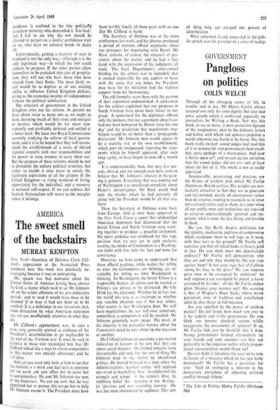The sweet smell of the backstairs
AMERICA MURRAY KEMPTON
New York—Sectetary of Defence Clark .Clif- ford's appearance at the Associated Press luncheon here this week was peculiarly en- couraging because it was so uninspiring.
His speech was that nonsense about the United States of America having been chosen by God, a theme which used to set Mr Johnson off on the wilder effusions of his pre-abdication period: and to read it would have been to be alarmed if to hear it had not been so to be soothed. It is a deficiency in our historians that, from distraction by what American statesmen say, we are insufficiently attentive to what they do.
Mr Clifford's appointment was, to take a case, very generally greeted as evidence of the President's determination to go implacable to the end of the Vietnam war. It must be said in fairness to those who misjudged him that Mr Clifford talked like a man to whom compromise in this matter was entirely abhorrent; and he still does.
And yet you need only look at him to see that the rhetoric is a mask and that here is someone put on earth and into office not to resist but to accommodate. He and Mr Johnson are men, of the backstairs. We can see now that he was appointed not to pursue this scrape but to help Mr Johnson escape it. The President must have been terribly lonely all these years with no one like Mr Clifford at hand.
The Secretary of Defence was at the NATO conferences last week, and his absence produced a period of extreme official scepticism about our prospects for negotiating with Hanoi. Mr Rusk remains, of course, the sincerest of pes- simists about the matter, and he had a free hand with the expression of his judgments all week. The State Department's semi-annual briefing for the editors was so immobile that it seemed impossible for any auditor to leave with the sense that any hopes the President may have for his initiatives had the slightest support from his bureaucracy.
The old formulas were there with the passion of their exposition undiminished. A spokesman for the soldiers explained that our purposes in South Vietnam have never been 'closer to our grasp.' A spokesman for the diplomats offered only the memory that our agreement about Laos had not been honoured by Hanoi 'even for one day' and the prediction that negotiations over Saigon would be no better than a 'propaganda discussion.' Mr Johnson then would appear to be a security risk to his own establishment, which goes on unappeased, repeating the argu- ments which he himself appeared, after such long agony, to have begun to turn off a month ago.
It is understandable, then, that very few per- sons abroad and not enough even here seem to believe that Mr Johnson's interest in bargain- ing is genuine. Everything that was coming out of Washington was unrelieved complaint about Hanoi's intransigence; Mr Rusk could find only the thistles which he had certainly all along told the President would be all that was there.
Then the Secretary of Defence came back from Europe. And at once there appeared in the New York Times a report that unidentified American diplomats had discovered that the Soviet Union and North Vietnam were work- ing together to produce a peaceful settlement. No more evidence was produced for this sup- position than we ever get in such analysis; reading the minds of Communists is a Washing- ton habit with few rules for fact and none for consistency.
However, we have come to understand that these official readings, while useless for telling us what the Communists are thinking, are in- valuable for telling us what Washington is thinking. To Washington, the Soviet Union is a responsible broker; its clients can be trusted as Peking's are always to be distrusted. Ho Chi Minh has his clearance Whether he in fact sees the world this way is as irrelevant as whether any sensible observer sees it this way either; what counts is that Washington does. We will have negotiations; the war will ease; sometime, somewhere, a compromise will be reached. Mr Johnson genuinely wants peace. The mark of his sincerity is the particular fantasy about the Communist mind he puts about on one occasion or another.
Mr Clifford refused all questions, a persuasive indication in lawyers of his sort that they are about secret business His formal remarks were interminable and very like the sort of thing Mr Johnson used to say before he abandoned politics. He looked forward to a time when the Administration's harshest critics 'will applaud our stand in South-East Asia': he celebrated the strength and tempei It the nation's fibre, its stubborn belief that progress is our destiny, its 'glorious and ever-ascending journey.' He was not once interrupted by applause. This sort of thing long ago escaped our powers of identification.
- What refreshed, barely concealed in the pub- lic speech, was the presence of a sense of reality.






































 Previous page
Previous page